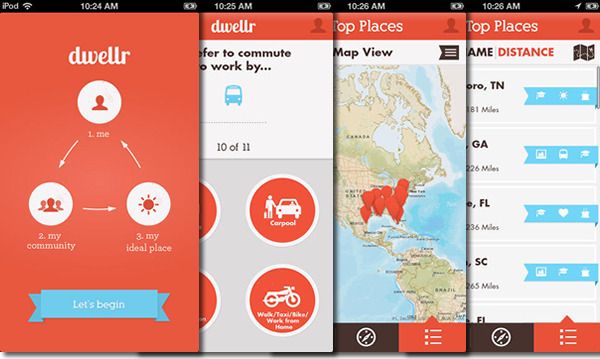Noted app-maker the U.S. Census Bureau is out with its latest creation, called dwellr, a mobile tool for helping people figure out the best place in America’s vastness for them to live. Here’s how the bureau describes it:
The Census Bureau’s new mobile app, dwellr, provides those on the go with immediate, personalized access to the latest demographic, socio-economic and housing statistics from the American Community Survey for neighborhoods across the nation. Using the level of importance you place on a location’s characteristics, the app generates a list of top 25 towns or cities most suitable for you. Once you have used the app, it saves your selections on your phone so you can see how they match up against each new place you visit.
The dwellr app rests on the premise that users have a rough understanding of the sort of environment that suits them, and simply need helping sorting through the data. Tap quickly through eleven screens — Are you male or female? Do you like small towns or big cities? What’s the educational level of the people with whom you tend to run? — and it comes up with the best places for you. (A small-scale user test: I got New York City; I live, happily, in Brooklyn.)
You can also use the app to quickly educate yourself on the demographics of any place you might be visiting, and while “Will anyone ever use this?” is a relevant consideration, there are other details at work here that make dwellr notable.
For one thing, there’s how much dwellr looks like a consumer-facing app the civilian tech world might produce. One imagines that lower-casing the name and doing away with that extraneous “e,” a la Flickr and Tumblr took quite a few in-house memoranda. Dwellr is attractive. Compare it to IRS2Go, which launched in 2011 as one of the earliest federal government mobile apps and which looks like it was designed by the Internal Revenue Service. Online at least, the government aesthetic seems on its way out.
There’s also the acknowledged fact that dwellr is proof of concept, and a way of building out the open-data-driven digital government push that the Obama administration has talked about making a priority. The census’ demography survey has, not without controversy, been around in some form for more than 150 years. But “what good are data,” writes the bureau, “if nobody but the experts can easily access them?” And on that front, they want help:
Imagine if an app matched your preferences with restaurant reviews, places with museums or most visited parks. With the Census Bureau’s application programming interface, developers can take the same statistics found in dwellr and apply them to any app they can imagine. We are eager to see new applications of these American Community Survey statistics that help people learn more about their communities using the same information businesses use to plan investments and services.
Diving a bit more deeply on that point, the app is also an exploration of the belief whose popular origins can be traced to Nudge, the book co-authored by former Obama administration official Cass Sunstein that suggests that people can be gently, well, nudged toward making better decisions. It’s a concept that the White House has talked about as “Smart Disclosure” (that, that gets capitalized) and also informs projects like the new Location Affordability Portal, a joint venture of the U.S. Department of Transportation and HUD.
Lastly, there’s a belief baked into a tool like dwellr that, despite hundreds of magazine articles over the years, there is no “Best Place in America to Live.” There’s a best place for you and your family. If more people choose places to live that are an appropriate fit, that’s good for them and it’s good for the cities and towns that host them. It’s no small matter. Tens of millions of Americans move a year, reports the Census Bureau. They’d know.
Dwellr is available in both Android and Apple iOS.

Nancy Scola is a Washington, DC-based journalist whose work tends to focus on the intersections of technology, politics, and public policy. Shortly after returning from Havana she started as a tech reporter at POLITICO.








